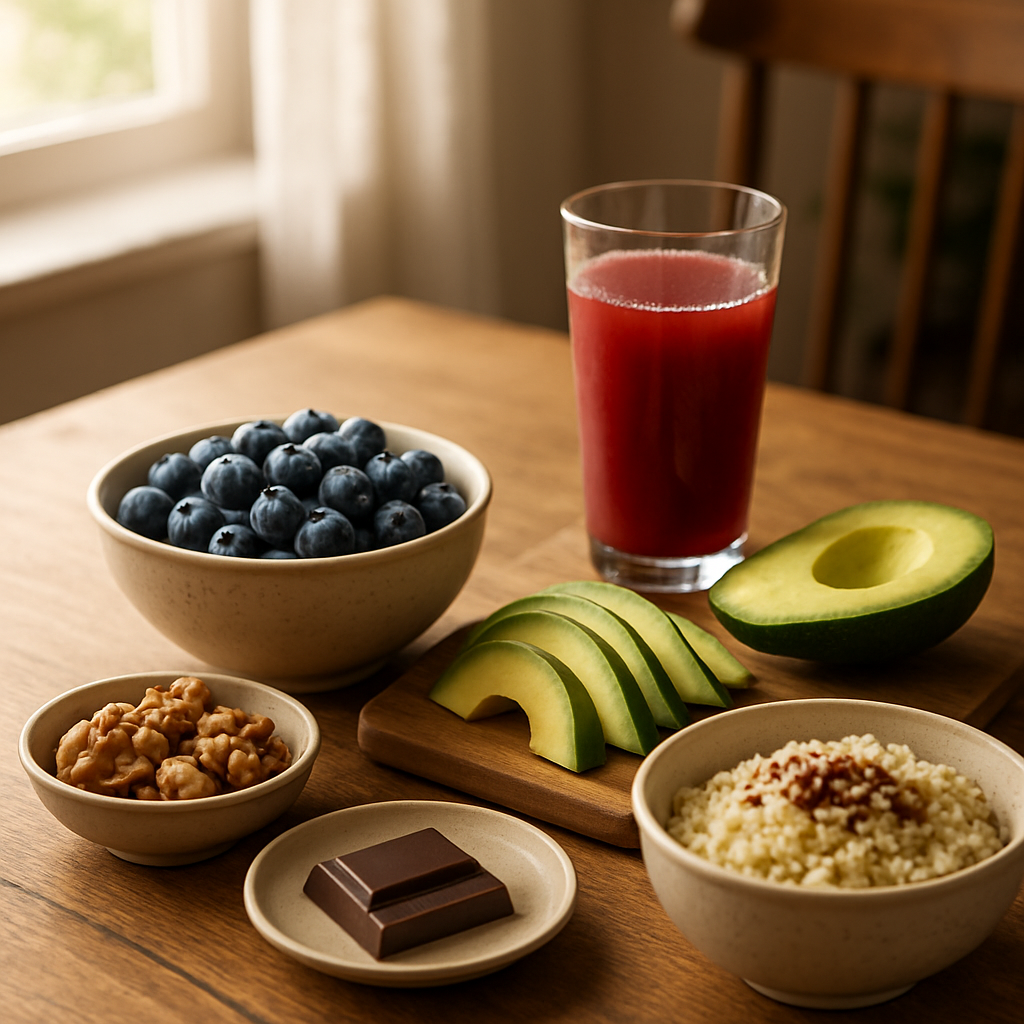10 Foods That Boost Brain Power and Improve Memory

In an age where mental sharpness is prized more than ever, many people are turning to nutrition as a way to maintain cognitive function. What we eat directly affects our brain health, influencing everything from memory and concentration to mood and overall mental performance. Research consistently shows that certain foods contain nutrients that nourish the brain, protect against age-related cognitive decline, and even improve memory function.
The brain is an energy-intensive organ, consuming approximately 20% of the body’s calories despite making up only about 2% of its weight. This metabolic workhorse requires specific nutrients to function optimally. By incorporating brain-boosting foods into your daily diet, you can support cognitive function and potentially enhance your memory and mental clarity.
Brain-Nourishing Nutrients and Their Food Sources
Your brain thrives on a variety of nutrients that work together to maintain its complex functions. Omega-3 fatty acids build cell membranes in the brain while antioxidants fight oxidative stress that can damage brain cells. B vitamins support energy production in brain cells, and certain proteins provide the building blocks for neurotransmitters that facilitate communication between neurons.
Fatty fish like salmon, mackerel, and sardines rank among the top brain foods due to their rich omega-3 fatty acid content. These essential fats, particularly DHA (docosahexaenoic acid), make up a significant portion of the brain’s cell membranes and are crucial for maintaining the structure and function of brain cells. A study published in the journal Neurology found that people with higher levels of omega-3s had larger brain volumes and performed better on memory tests.
“I started eating salmon twice a week after my doctor mentioned its brain benefits,” says Dr. Maria Chen, a neurologist I spoke with. “Within a few months, I noticed I was recalling patient details more easily. While that’s just my personal experience, the research backing omega-3s is substantial.”
Blueberries and other dark berries contain anthocyanins, powerful antioxidants that have been linked to improved brain function. These compounds cross the blood-brain barrier and accumulate in areas of the brain associated with learning and memory. Research from Tufts University suggests that regular consumption of blueberries may delay short-term memory loss and reduce the effects of dementia and Alzheimer’s disease.
Turmeric, the vibrant yellow spice common in Indian cuisine, contains curcumin, which has both anti-inflammatory and antioxidant properties. Inflammation and oxidative damage are thought to play a role in age-related brain diseases and cognitive decline. Curcumin may help clear amyloid plaques, which are a hallmark of Alzheimer’s disease. For better absorption, try consuming turmeric with black pepper, which contains piperine that enhances curcumin absorption by up to 2,000%.
Broccoli and other cruciferous vegetables are rich in compounds called glucosinolates, which the body breaks down into isothiocyanates. These compounds may reduce oxidative stress and lower the risk of neurodegenerative diseases. Broccoli is also high in vitamin K, which is known to enhance cognitive function and improve brainpower.
Pumpkin seeds might seem unassuming, but they pack a powerful punch when it comes to brain health. They’re an excellent source of magnesium, zinc, copper, and iron all minerals essential for brain function and development. Zinc is vital for nerve signaling, magnesium is critical for learning and memory, while copper helps control nerve signals. Just a handful of these seeds daily can contribute significantly to your recommended daily intake of these vital nutrients.
Dark chocolate contains flavonoids, caffeine, and antioxidants. Flavonoids gather in the brain regions dealing with learning and memory, possibly improving memory while also slowing down age-related mental decline. A small square of dark chocolate (70% cacao or higher) daily could provide these benefits without excessive sugar intake.
Nuts, especially walnuts, have been linked to better brain health. A 2015 study from UCLA found that higher walnut consumption was associated with improved cognitive test scores. Walnuts are high in alpha-linolenic acid (ALA), a plant-based omega-3 fatty acid, as well as antioxidants and vitamin E, which may help protect the brain from oxidative stress.
Eggs contain several nutrients tied to brain health, including vitamins B6 and B12, folate, and choline. Choline is used by the body to create acetylcholine, a neurotransmitter that regulates mood and memory. Two large eggs provide about 294 mg of choline, more than half the recommended daily intake for adults.
Leafy greens such as spinach, kale, and collards are packed with nutrients like vitamin K, lutein, folate, and beta carotene. Research suggests these plant compounds may help slow cognitive decline. One study found that people who ate one to two servings of leafy greens daily had the cognitive abilities of someone 11 years younger compared to those who rarely ate them.
Coffee, when consumed in moderation, may support brain health through several mechanisms. The caffeine in coffee blocks adenosine, a chemical messenger that makes you feel sleepy, thereby increasing alertness. Coffee is also rich in antioxidants that may support brain health. Long-term coffee consumption has been linked to a reduced risk of neurological diseases, such as Parkinson’s and Alzheimer’s.
Practical Ways to Incorporate Brain Foods Into Your Diet
Adding these brain-boosting foods to your diet doesn’t have to be complicated. Start small by making simple swaps and gradually building new habits.
For breakfast, consider a bowl of oatmeal topped with blueberries and walnuts, or eggs with sautéed spinach. This combination provides protein, complex carbohydrates, and several brain-boosting nutrients to start your day.
Lunch could include a salad with dark leafy greens, topped with pumpkin seeds and salmon or sardines. Add a turmeric-based dressing for an extra brain boost.
For dinner, try a stir-fry with broccoli and other colorful vegetables, served with a side of quinoa or brown rice. These complex carbohydrates provide steady glucose to the brain, which it needs for optimal function.
Snacks can be simple yet nutritious: a small handful of nuts, a few squares of dark chocolate, or some fresh berries can satisfy hunger while supporting brain health.
I struggled with incorporating these foods until I started meal prepping on Sundays. Now I roast a salmon fillet, cook a batch of quinoa, and wash and chop vegetables for the week. This makes it much easier to throw together brain-healthy meals when I’m busy or tired.
Remember that consistency matters more than perfection. You don’t need to completely overhaul your diet overnight. Small, sustainable changes can lead to significant benefits over time.
Water intake also plays a crucial role in brain function. Even mild dehydration can impair cognitive performance, including memory and attention. Aim to drink water throughout the day, and consider limiting alcohol consumption, which can have negative effects on brain health when consumed in excess.
Beyond individual foods, research suggests that dietary patterns like the Mediterranean diet, which emphasizes many of the foods mentioned above, may have protective effects against cognitive decline. This diet focuses on plant foods, healthy fats like olive oil, moderate amounts of fish, and limited red meat and processed foods.
The connection between gut health and brain function is another emerging area of research. The gut microbiome communicates with the brain through what’s called the gut-brain axis. Fermented foods like yogurt, kefir, sauerkraut, and kimchi contain probiotics that may support this connection and potentially benefit cognitive function.
While diet plays a significant role in brain health, it’s just one piece of the puzzle. Regular physical exercise, quality sleep, stress management, and mental stimulation all contribute to cognitive function and memory. A holistic approach that addresses all these factors is likely to have the greatest benefit for brain health.
By making thoughtful food choices, you can provide your brain with the nutrients it needs to function at its best. Start incorporating these brain-boosting foods into your meals today, and you might just notice improvements in your memory, focus, and overall cognitive performance. Your brain works hard for you every day feeding it well is one of the best ways to return the favor.


